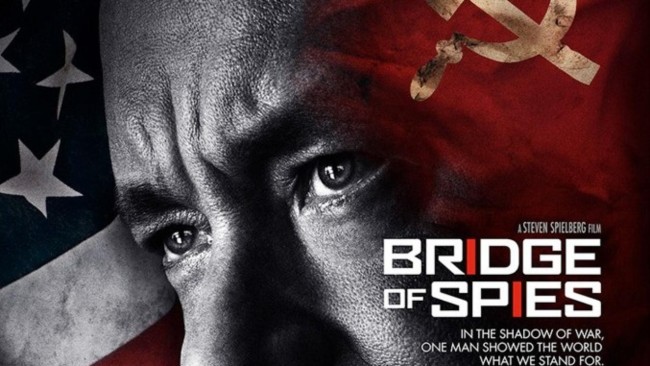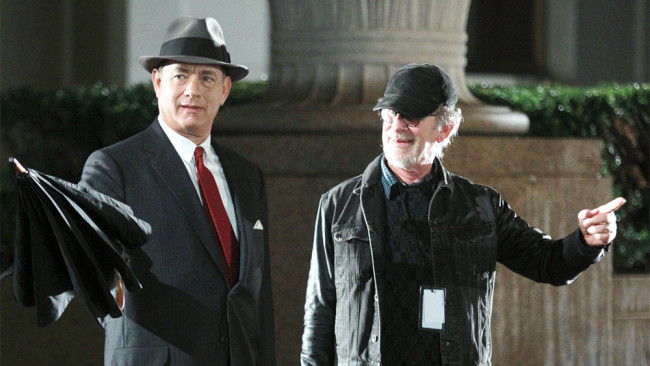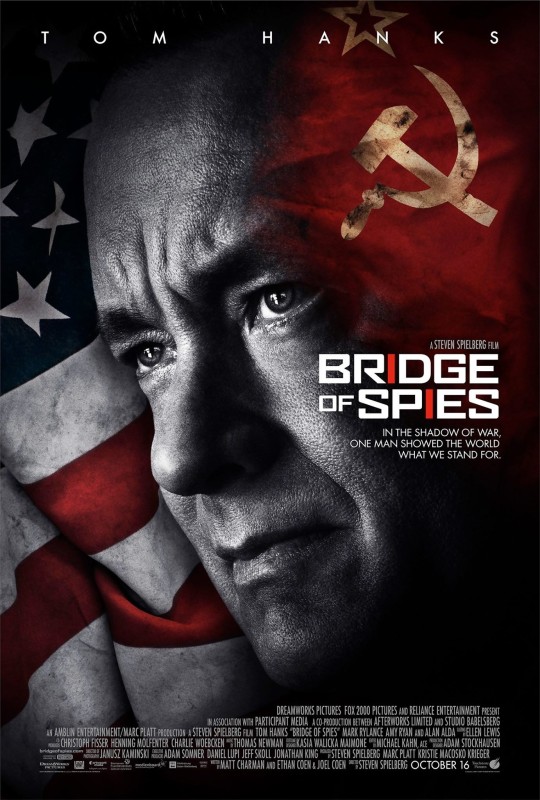By James Hancock October 16th, 2015
After 3 years away from the director’s chair, Steven Spielberg returns with Bridge of Spies, a true story about lawyer James B. Donovan who successfully negotiated the release of an American pilot from the Soviets at the height of the Cold War. Tom Hanks proves once again to be the Jimmy Stewart of his generation with his clean-cut, all-American performance as Donovan, a decent man facing an impossible situation where he must overcome ignorance and corruption at home and abroad to bring about a peaceful resolution to a political crisis between two nations on the verge of nuclear war. In an unusual creative switch for Spielberg, he employed the writing talents of Joel and Ethan Coen for the screenplay resulting in a script with craftier, more nuanced dialogue than is typical for a Spielberg film. For a director who built his reputation on the some of the best escapist entertainment from my childhood (Jaws, Close Encounters of the Third Kind, Raiders of the Lost Ark), Bridge of Spies is a movie that fits neatly into the latter part of Spielberg’s career, one more preoccupied with history and politics (Munich, War Horse, Lincoln). As much as I miss the Spielberg of the 70s & 80s, this is a very solid, uplifting film. While some might find both the story and its tone somewhat old-fashioned, even bordering on quaint, this movie will definitely find a warm welcome with those audience members who often bemoan that ‘they just don’t make movies like they used to.’
The story of Bridge of Spies begins with a simple courtroom drama. When the Soviet spy Rudolf Abel (played superbly by Mark Rylance) is captured by the FBI, James B. Donovan (Tom Hanks) is asked to be his lawyer in order to create the appearance that even spies receive a fair trial. While the justice system seems eager just to get Abel into the electric chair as quickly as possible, Donovan surprises both his co-workers and his family with his impassioned defense of Abel, a man who was arrested on evidence secured in an illegal fashion and whose only crime was serving his country in a time of war. Donovan becomes one of the most hated men in America when he successfully saves his client from execution in order to use him as a potential bargaining chip in case any American soldiers or spies are ever captured by the Soviets. Donovan’s point of view proves to be prophetic when an American pilot is shot down over Russia while taking surveillance pictures. Donovan is then chosen by the CIA to go to Berlin to negotiate the swap of prisoners, a swap that is made more complicated when an American economics student is falsely accused of being a spy and imprisoned in East Berlin at a time when the Berlin Wall is nearly fully constructed with snipers in position to eliminate anyone trying to cross into West Berlin. Donovan must then navigate the political mine field of the East German government as well as the USSR as he tries to negotiate a swap of one Soviet spy in exchange for both Americans in captivity. It is the type of earnest story that Tom Hanks and Steven Spielberg know how to tell better than anyone else alive. But I worry that the film might struggle to find an audience outside of the Cold War buffs and historians who will likely find this drama of cloak and dagger negotiations to be fascinating.
It has been interesting to watch the evolution of Spielberg’s career over the years. While my heart might belong to his earliest work, I get the sense that Spielberg’s great passion in life is history, in particular WWII and the years that followed. One could easily make a case for Empire of the Sun and Schindler’s List as the most emotionally stirring films of Spielberg’s career. While in my opinion his talents are best put to use creating awe-inspiring roller coaster rides like Jurassic Park, he seems at his happiest as a storyteller when tackling politics and history. A movie like Bridge of Spies reminds me somewhat of the wholesome movies of the 1930s made popular by Frank Capra and John Ford. Bridge of Spies has far more in common with the tone of John Ford’s Young Mr. Lincoln (1939) or Frank Capra’s Mr. Smith Goes to Washington (1939) than with any of the movies that made Steven Spielberg a household name. So if I sound somewhat lukewarm on this film, it is only because it is the kind of movie where I thoroughly enjoy seeing it once but never again. On the other hand, a movie like Close Encounters of the Third Kind has never lost the power to take me back to a childlike sense of awe at the power of the movies. If the last ten years are any indication, I am skeptical that Spielberg will ever give me one of those experiences ever again.
I am one of the Co-Hosts of Wrong Reel and you can find more of our content here:









